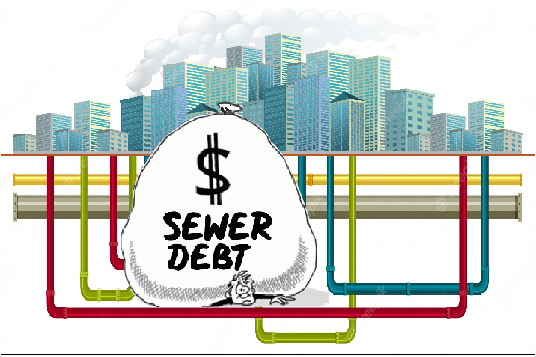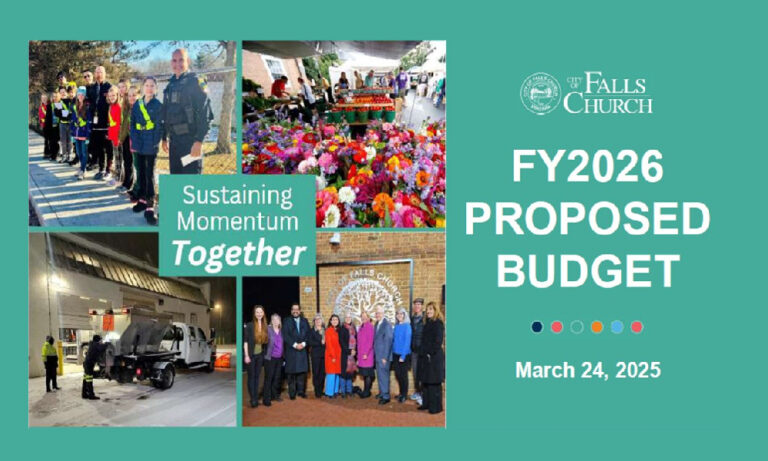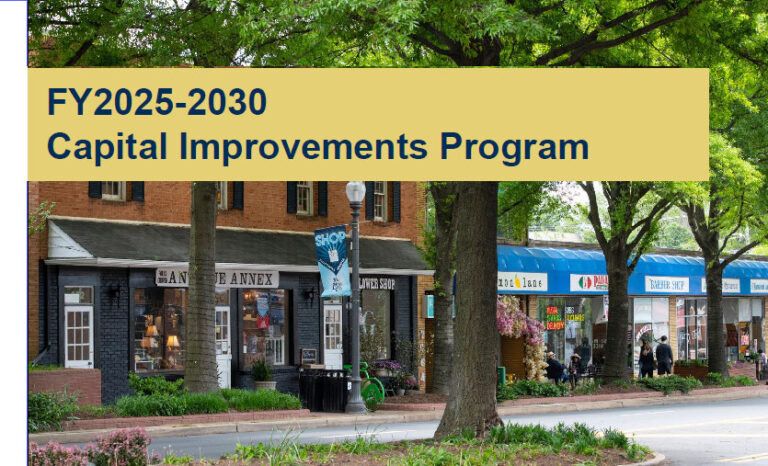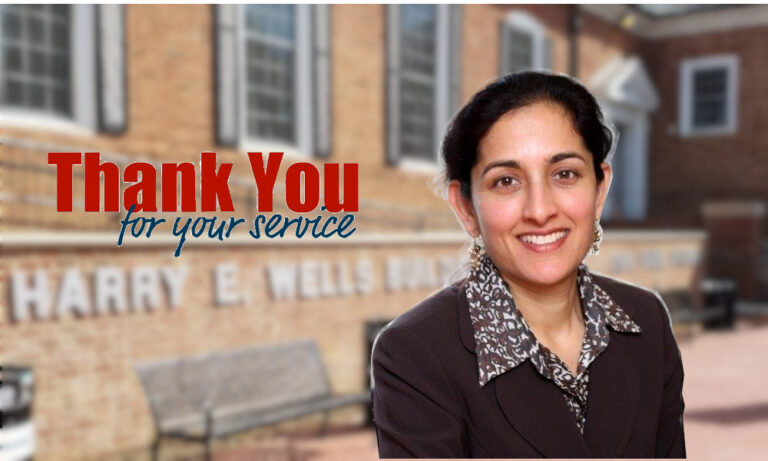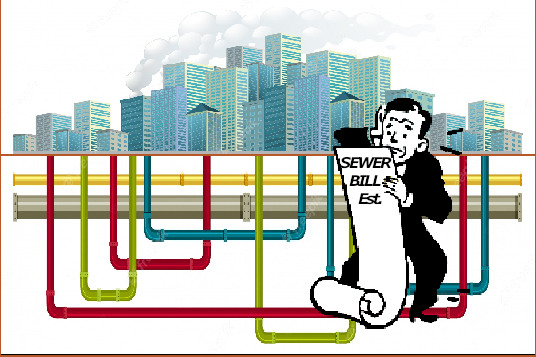The Little City’s Big Sewage Challenge – Part 3: Will Debt (i.e., Taypayers) Pay For Growth? (Additional Update)
Additional Update:
City Manager Wyatt Shields announced to the City Council at its August 12, 2024, meeting that Arlington County has agreed to accept sewer flows “from the center of Falls Church” to the County’s sewage treatment system. Sewer flows from the Quinn Homestretch Project, now in the site planning phase, will go to Arlington, he said. The Council approved the project last March and has been in negotiations with Arlington since then.
Update: Ongoing negotiations with Fairfax and Arlington
The City Council received a briefing from City staff on negotiations with Fairfax County about near- and long-term sewage treatment capacity purchases and necessary sewer infrastructure improvements at Council’s May 20, 2024, work session.
Deputy City Manager Andy Young reported that the City is close to an agreement with the County that would enable the immediate purchase of 0.5 million gallons per day (MGD) of additional treatment capacity while setting expectations for future capacity purchases of as many as three more 0.25 MGD purchases to support ongoing development through 2050.
The agreement also ties treatment capacity buys to a cap on peak flows during major rain events, which requires the City to design and construct a flow equalization basin under Cavalier Trail Park in the next three years. Fairfax has basically given Falls Church “a three-year grace period to address peak flows,” Mr. Young said.
In addition to building the basin, or vault, the City would commit $300,000 in additional annual investments if it exceeds agreed-to limits on peak flows.
The challenge of the Cedar Lane sub-shed and a bigger vault
Remaining to be negotiated is ultimate responsibility for peak flows in one of three sewer sub-sheds – the Cedar Lane sub-shed, which includes 339 homes, two-thirds of which are in Fairfax County but use the City’s sewer system. The City would complete relining of all sewer mains, reline all manholes, and install manhole rain-guards in this sub-shed. Fairfax currently wants Falls Church to stop any new connections citywide if certain peak flow targets are exceeded. Final terms are being discussed, and staff anticipate will be ready for City Council’s review and agreement by this fall.
Director of Public Works Zak Bradley discussed a study by engineering firm Greeley and Hanson that provides cost estimates for the flow equalization basin. The vault that has been discussed thus far would have a capacity of 0.75 million gallons (MG), would meet anticipated growth through 2030, and would cost $10.11 million to construct, not including the $775,000 design fee. An alternative vault size would have a capacity of 1.0 MG, would accommodate potential development through 2050, and would cost $13.4 million to build, Mr. Bradley said. The larger tank would give Falls Church “flexibility and a relatively high level of independence from Fairfax County” for the next 25 years, he added.
Council comments
In response to questions from Council Member Justine Underhill about vault size and the need for an additional staff member to manage this facility, Mr. Bradley said that triggering all of this “is that our baseline usage every day has increased.” He noted that to be most cost efficient, Council will need to decide on the size of the vault before proceeding with its design. The staff will work on a recommendation as to the size of the basin and a final funding strategy for presentation to the Council later this summer.
In response to a question from Council Member Erin Flynn, Mr. Bradley confirmed that future treatment capacity purchases with Fairfax assume that the 10-story, mixed-use Quinn Homestretch project pumps its sewage to Arlington rather than Fairfax County, along with any other new development projects in the South Washington Street area. Negotiations with Arlington are continuing, and Mr. Bradley anticipates they will be successful.
In looking ahead to future capacity purchases, Ms. Flynn said there needs to be “more conversation around the amount of development we are projecting,” particularly given “the compounding costs for development that the community may not even accept.”
Council Member David Snyder said that staff and the Council “need to be clearer with the public about the true cost of development.” While the City receives the benefit of new tax payments, there are also significant infrastructure costs, he added.
Mayor Letty Hardi asked for a clearer description of how much and when additional treatment capacity purchases would be made. Given that the construction of the vault will be largely financed, “any debt should last us a good amount of time,” she said.
Resources
- City Council Meeting, May 20, 2024. YouTube video. Presentation by Deputy City Manager Andy Young and Department of Public Works Director Zak Bradley and Council discussion begins at timestamp 2:30:20 and concludes at 3:41:50.
- City Council Meeting, May 20, 2024. This video will not display properly on a small screen as it includes the agenda.
- Sanitary Sewer Agreement Staff Report, May 20, 2024.
- Sewage Flow Equalization Feasibility Report, Greeley and Hanson, April 2024.
Summary
May 16, 2024
The City Council at its May 6, 2024, work session deferred beyond its May 13, 2024, deadline to approve the FY2025 budget further discussion and resolution of how long-term sanitary sewer infrastructure needs facing Falls Church will be funded.
Nonetheless, Council members signed off unanimously May 13 on the staff proposed Capital Improvements Program (CIP), which details sewer investments through FY2030, with the addition of an asterisk to indicate more discussion will take place. The goal of future conversation for some Council members is to ensure that the anticipated $5.8 million capacity purchase planned for FY2028 to meet the demands of growth is actually borne by developers rather than taxpayers.
The FY2025 budget calls for increases in the sewer usage rate and new connections fees. City Manager Wyatt Shields effectively acknowledged that growth has not paid for growth, saying that there is a 10% gap in the new connections, or availability, fees that have been collected and the actual growth the City has experienced.
Meantime, near term infrastructure requirements, particularly of the flow equalization basin to meet Fairfax County’s requirement that the City address peak flows from major rain events, will largely be debt financed. City staff currently estimates costs to purchase additional treatment capacity from Arlington and Fairfax Counties, address inflow and infiltration of stormwater into the sewer system, and build the basin, or vault, under the tennis courts in Cavalier Trail Park will total $37 million over the next six years.
According to the proposed CIP for the sewer utility, nearly $28 million of this amount would be funded by debt, with $11.5 million of that debt falling in FY 2026, primarily to construct the vault. The City Manager quashed Council hopes that this facility might be paid for with American Rescue Plan Act (ARPA) funds.
Proposed FY2025 appropriation of sewer fund and sewer CIP
Following its May 6, 2024, work session on the FY2025 budget and the subsequent May 13 budget votes, the City Council approved the following, staff recommended sanitary sewer budget for the coming fiscal year, which begins July 1, 2024.
| FY 2024 Adopted | FY 2025 Proposed | |
| Sanitary Sewer Fund Expenditures | ||
| Administration and Engineering | 779,797 | 850,557 |
| Collection and Disposal | 1,729,136 | 1,803,964 |
| Debt Service | 2,027,462 | 1,575,479 |
| Transfer to CIP | 2,234,584 | 3,307,129 |
| Reserves | – | 1,969,000 |
| Total Sanitary Sewer Fund Expenditures | 6,770,979 | 9,506,129 |
| Sanitary Sewer Fund Revenues | ||
| Charges for Services | 4,607,000 | 6,769,000 |
| Investment Income | 45,000 | 150,000 |
| Use of Fund Balance | – | 2,587,129 |
| Total Sanitary Sewer Fund Revenues | 4,652,000 | 9,506,129 |
Sewer Capital Improvements Program funded by $28 million debt
The corresponding Capital Improvements Program (CIP) for the sewer utility for the next six years as laid out by the staff follows. In his comments, City Manager Wyatt Shields reiterated staff’s belief that “the Sewer Fund should stand on its own and not have transfers from the General [Government] Fund.” Accordingly, staff has not used general funds to drive down sewer debt. (See Pulse posts: A Review of the FY 2025 Budget and The Capital Improvements Program 2025 and Beyond.)
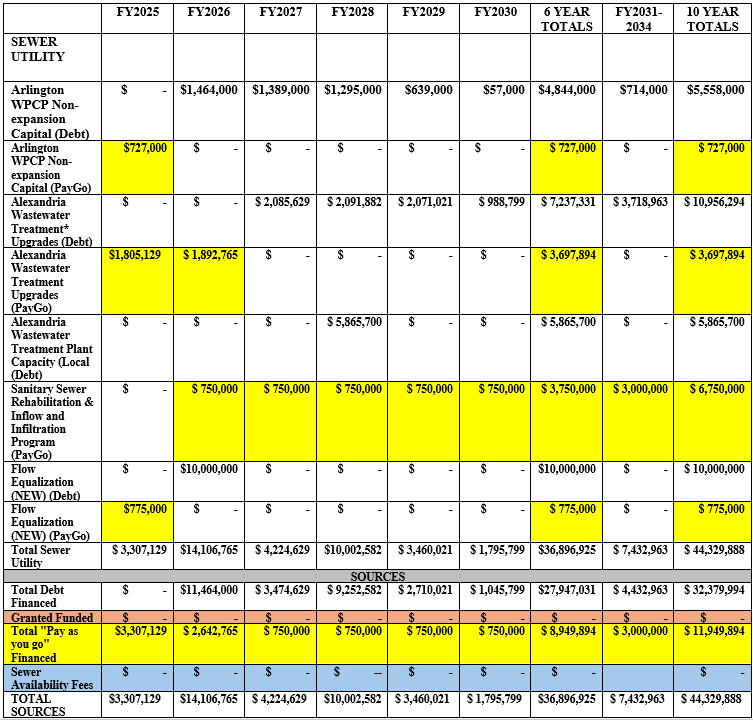
Increasing sewer rates and fees
As part of his FY2025 budget presentation, Mr. Shields asked that the City Council approve a 3.6% increase in the sanitary sewer commodity or usage fees paid by City residents and businesses and a 10% increase in sewer availability or connection fees paid by developers. Together, these fees fund the City’s Sewer Utility Fund, which is separate from the General Government Fund.
“Increasing the sanitary sewer rate will provide approximately $145,000 in regular operating revenues required to operate the City’s sanitary sewer system and assure the continued financial health and stability of the sewer fund,” according to the fiscal impact statement in the ordinance that the City Council approved on May 13. The impact of higher availability charges for new connections to the sewer system from construction ranging from single-family homes to multi-family apartment and condominium buildings “will have varying fiscal impact depending on the pace” of such construction.
While sewer usage fees have tended to keep pace with inflation, rising by small amounts each year, availability fees were increased in FY2024 after remaining fixed since FY2014. Mr. Shields essentially acknowledged that growth has not paid for growth, saying that there is a 10% gap in the fees that have been collected and the actual growth the City has experienced. Now, it seems that taxpayers will be called upon to help bridge this gap.
With approval by the City Council, the sewer usage rate will rise from $10.48 per 1,000 gallons to $10.86 per 1,000 gallons, an increase of 3.6%, effective July 1, 2024, the start of FY2025. “This increase would result in an approximately $18 yearly increase to the sanitary sewage fee for a residential bill with 12,000 gallons of sewage usage in the City,” the approved ordinance states. “This rate increase is necessary to pay for increased costs in employee compensation, treatment costs, replacement of aging machinery, equipment, and sewer pipes. Additionally, the [Sewer Utility Fund] must fund upgrades to the treatment plants of our partner jurisdictions, Arlington and Fairfax” Counties.
Availability fees will increase as follows:
| Type of Development | Current Fee | Proposed Fee |
| Single-family dwelling, detached, semi-detached duplex, or townhouse | $8,860 | $9,746 |
| Apartment or condominium building units | $7,088 | $7,797 |
| Motel, hotel unit | $2,215 | $2,437 |
| Drainage fixtures units (DFU) for commercial | $443 | $487 |
“The City uses availability fees…to offset costs of constructing new facilities and expanding the capacity of our sewerage facilities,” the ordinance explains. “The City also uses availability fees to offset costs of purchasing capacity at waste water treatment plants” in Arlington and Fairfax.
$37 million of the six-year CIP is for sewer upgrades
As detailed in the chart above, upgrades to the sanitary sewer utility account for $37 million of the City’s revised $189 million total CIP over six years from FY2025 through FY2030. These improvements include construction of a flow equalization basin to address Fairfax County’s requirement that Falls Church reduce rainfall derived inflow and infiltration to the City sanitary sewer collection system and reduce peak flow associated with large rain events.
This basin, or vault, is “preliminarily expected” to cost $10,775,000 – $775,000 in FY2025 to design and $10 million in FY2026 to build, likely under the tennis courts at Cavalier Trail Park. In response to a question from Council Member Erin Flynn at the Council’s April 15, 2024, work session, Mr. Shields said the cost of the peak flow equalization vault will include remediation of the park following the vault’s construction.
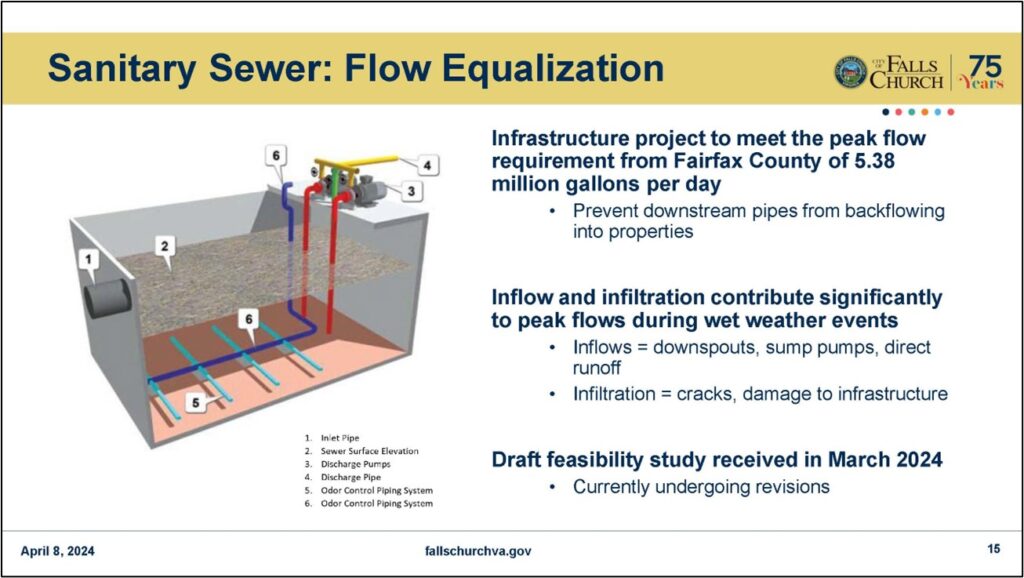
The sewer CIP also includes a full-time manager to oversee ongoing sanitary rehabilitation, minimizing inflow and infiltration, and constructing the flow equalization basin. The sanitary sewer project manager position is budgeted at $141,200.
In response to Council member questions about financing sewer needs, including the need for more sewage treatment capacity as a result of new development, City staff appeared to stand by their March 11, 2024, staff report and recommendation that financing the initial $20.1 million in expenses include a combination of $5.8 million in cash and $14.3 million in long-term debt. Debt service over 20 years would be paid for by increases in sewage user fees of 4% per year and availability fees for the new sewer connections charged to developers. [See Pulse post: The Little City’s Big Sewage Challenge – Part 2: Has Growth Paid For Growth?]
Page 22 of City staff’s Budget Questions & Answers document included the following statements:
“…the City anticipates issuing debt to cover the costs of the treatment capacity purchase and peak flow equalization vault, which will be repaid through the Sewer Fund using a combination of availability fees and sewer service fees that will be realized with the addition of the new customers to the City sewer system.
“Capital investments in sanitary sewer infrastructure are included in the Sewer Fund CIP. Specifically, the peak flow equalization vault is in the FY2025 CIP. The purchase of capacity from Fairfax was included in the FY2024 CIP. Debt service is included in the Sewer Fund’s operating budget.” [The Pulse has asked the City to confirm that the capacity purchase of 0.5 million gallons per day (MGD) of additional capacity is included in the current year CIP and inquired what the funding source is (e.g., cash, American Rescue Plan Act (ARPA) funding, reserves, or some other source) and is awaiting the staff’s response.]
Sources of funding other than debt
Asked again by Mayor Letty Hardi and other Council members at their April 8, 2024, meeting whether remaining ARPA funds from the total $18 million the City received might be applied to sewer costs, Mr. Shields said staff “are exploring redirecting some ARPA funds to the Sewer Fund.” However, he added, “I want to manage expectations of ARPA funds, much of which has already been encumbered. There won’t be a huge amount of ARPA funds to move.” Deputy City Manager Andy Young added that timing is an issue. “We have to encumber ARPA funds by December 31, 2024, so ARPA will be used for sewer capacity purchases.”
At the May 6 work session, Council Member Flynn noted that the City Council had not seen alternatives to a nearly entirely debt financed plan. She expressed particular concern about more than $5.8 million in additional 0.25MGD capacity in the CIP for FY2028 for future growth that has yet to be realized and asked again about ARPA funds.
Mr. Shields said that the staff has looked at ARPA funds most seriously as an alternative to increased debt. “But the more we’ve looked at it, the less attractive it [became[ because the grants that are coming in are all reimbursement grants. And the ARPA monies that we are using for stormwater improvements are cash-in-hand, and we’ve already signed contracts and we’re going to be drawing down those ARPA dollars this spring and over the summer,” he stated. “If we switch out reimbursement money, it’s going to impact our cash flow and be pretty messy.”
“We will certainly talk more with the Council about the plan for financing and how the Sewer Fund will be able to meet all these obligations, which are significant – there’s no question about it. But with our finance team, we think we do have a plan for how the Sewer Fund can meet these obligations, even with this debt, with rate increases that are generally tied to inflation as opposed to dramatic increases to meet higher debt service.”
Mr. Shields received support from Mayor Hardi who said the City Council would be able to approve each of three tranches of funding proposed for the sewer infrastructure, “so this is not the last time Council will have to decide [these issues].” Ms. Hardi was referencing the City staff’s March 11, 2024 report that proposed $14.3 million in debt financing for the 0.5MGD capacity purchase and the flow equalization basin, which would be obligated in three tranches: $4.3 million in FY2025, $5.0 million in FY2026, and $5.0 million in FY2027. This proposal could change and predates the larger debt called for in the CIP.
Mr. Shields added, “The CIP is important for laying out a vision and a plan, but the Council has many steps along the way to adjust that plan.”
Council Member Flynn suggested that the FY2028 sewer capacity purchase simply be listed as “unfunded,” but Chief Financial Officer Kiran Bawa feared the impact of such a statement on the City’s AAA bond rating. In response, Council Member David Snyder suggested adding an asterisk to the CIP mention of the FY2028 sewer capacity purchase, in particular, “so it’s clear that we will have future conversation.” The City Council agreed to Mr. Snyder’s proposal.
References
- City Council Meeting, May 13, 2024. YouTube video.
- City Council Meeting, May 13, 2024. This video will not display properly on a small screen as it includes the agenda.
- FY2025 Budget Questions, May 13, 2024, Pages 1-36.
- (TO24-03) FY2025 Proposed Budget & CIP Ordinance.
- (TO24-06) Ordinance to Amend, Reenact and Recodify Chapter 42, “Utilities,” to Revise Sewer Rates and fees, May 13, 2024.
- City Council Work Session, May 6, 2024. YouTube video.
- City Council Work Session, May 6, 2024. This video will not display properly on a small screen as it includes the agenda.
- FY2025 Budget Review, May 6, 2024. Staff report.
- City Council Meeting, April 8, 2024. YouTube video.
- City Council Meeting, April 8. 2024. This video will not display properly on a small screen as it includes the agenda.
- CIP Work Session Slides. Staff presentation at the City Council work session, April 8,2024.
- FY2025-2030 Capital Improvements Program – revised 3-20-2024, City of Falls Church Six-year Capital Improvements Program FY 2025-2030. This 178-page document includes information about individual projects in the CIP.
- City Council Work Session, April 1, 2024. This video will not display properly on a small screen because it includes the agenda.
- PowerPoint Presentation Slides (PDF, 30 pages) Proposed 2025 budget presentation by the City Manager, Wyatt Shields, April 1, 2024.
- Proposed 2025 Budget (PDF, 310 pages).

